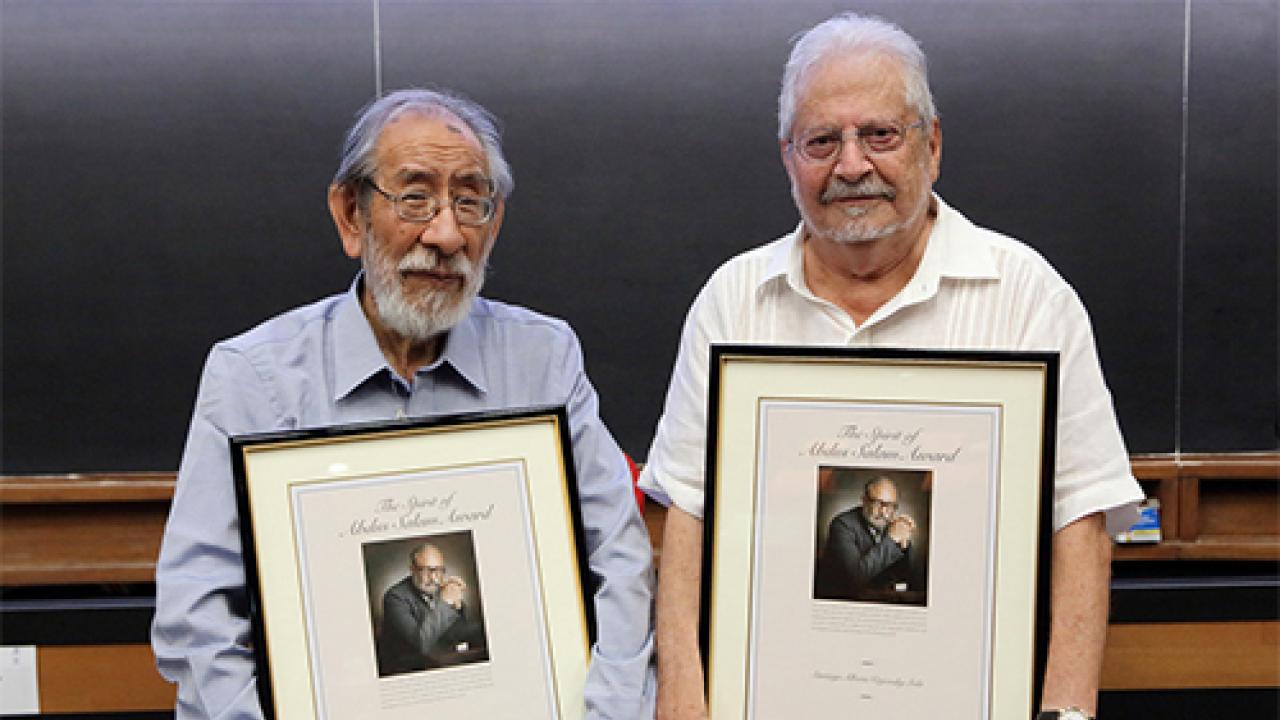
When Abdus Salam opened ICTP in 1964, he became a pioneer in supporting sustainable science in the developing world. As a role model, he has inspired many subsequent generations of scientists who have ensured that Salam's vision of science for everyone, especially those in disadvantaged parts of the world, remains alive.
This year's recipients of the Spirit of Abdus Salam Award--a yearly prize established by Salam's family--embody this spirit. Victor Latorre, a physicist from Peru, and Alberto Verjovsky, a mathematician from Mexico, were honoured in a ceremony at ICTP on 24 August for their commitment to Salam's dream.
 |
| From left: Osama Salam, grandson of Abdus Salam, Spirit award winners Alberto Verjovsky and Victor Latorre, and ICTP Director Fernando Quevedo |
Victor Latorre's influence on the development of Peruvian physics and science has been extraordinary. After earning his PhD in physics from the University of Maryland, USA, he returned to Peru, where he has enjoyed a long, successful career in promoting scientific excellence. His achievements include serving as director of the Peruvian Institute of Nuclear Energy, as well as co-founding, with Abdus Salam, the “Multiciencias” initiative to develop international cooperation and to bring foreign scientists to Peru in order to get fruitful scientific exchanges. Through his work as a professor at Peru's Universidad Nacional de Ingeniería, Universidad Ricardo Palma and the Universidad Nacional de San Antonio Abad del Cusco, Latorre has influenced hundreds of Peruvian science students. At ICTP, he served on the Centre's Scientific Council as its first member from South America.
Latorre, who was the first Peruvian to earn a physics PhD, continues to advocate strongly for science in his home country in the spirit of Abdus Salam. "We still keep his memory alive, remembering that he, with all the force of his spirit, convinced the UN and other countries to contribute to Multiciencias," said Latorre. Unfortunately, Multiciencias became a victim of its location--in the heights of Machu Picchu--where tourism has flourished. The building hosting the institute was converted to a hotel to meet the high demand for lodging, and so Multiciencias was left homeless, Latorre explained.
"It was a home that was lost, but not forever. We are now again convincing our government to re-instate it to provide for Peru and neighboring countries to learn physics and science for the betterment of the world," said Latorre. His goal is to re-open the science centre in 2021 or 2024, when Peru celebrates 200 years of independence.
"We want to reconstruct science in Peru," stated Latorre, adding that he believes that the new Peruvian government, which is led by an engineering graduate, understands that science is a basic tool for development. "We hope in days to come, especially as we wait to celebrate the nation's anniversary, that he will understand the need for science in building a life in Peru."
Alberto Verjovsky has been highly influential in the development of mathematics in Mexico. He enjoyed a close working relationship with Abdus Salam since his first visit to the Centre in the early 1980s. Indeed, it was he who convinced Salam that ICTP should establish a section in mathematics. Verjovsky played an important role in the section's eventual creation and coordinated its work for nearly a decade.
"Mathematics and physics have always been hand in hand, but with the arrival of new theories like string theory and membranes, it was necessary to bring the two fields together. That is why Professor Salam decided to create a mathematics section at ICTP," explained Verjosky. With the creation of the section, ICTP hosted numerous schools and workshops, attracting mathematicians from throughout the world.
"For me it was a great experience to have met so many mathematicians. ICTP remains unique; it was one of the greatest ideas of Professor Salam. To me it is a great honour to have been his collaborator," said Verjosky.
He added that ICTP's impact on mathematics in the developing world is indisputable, and reaches to the highest levels of the discipline. "ICTP has been absolutely fundamental in the development of mathematics in the developing world. Its influence reaches all the way to Fields Medallists," claimed Verjosky. He gave as an example the case of the late Iranian medallist Maryam Mirzakhani, the only woman to win the Fields Medal, and Artur Avila, the Fields Medallist from Brazil. "Maryam is a product of a school in Iran that was actually formed because many people came here to ICTP, so that is an example of ICTP's influence. The same is true in Brazil," he explained.
ICTP's Mathematics section continues its fundamental role in fostering mathematics research and education for thousands of scientists, in particular for those from emerging countries, as in the spirit of Salam’s legacy.
About the Spirit of Abdus Salam Award
The Spirit of Abdus Salam Award may be given to anyone within the extended ICTP family of scientists and non-scientists, and administrative staff alike who can show that they have worked tirelessly to further Abdus Salam's humanitarian passion and vision for the cooperation, promotion and development of science and technology in the developing world.
















